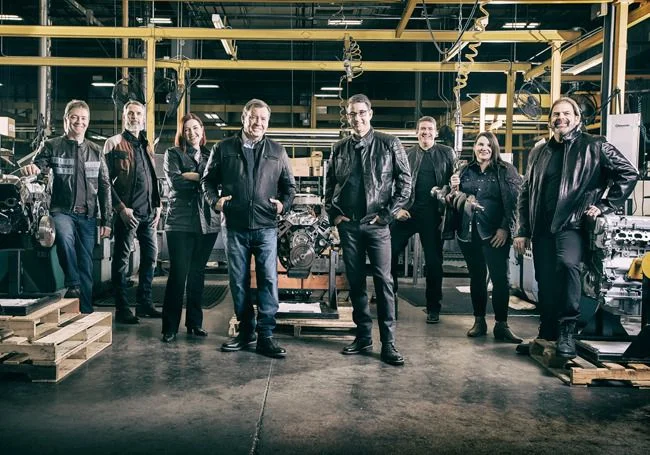The Great Game of Business is a company whose origins were from the Springfield Re-manufacturing Corp. (SRC). For those who do not know about Jack Stack and Springfield Re-manufacturing, I will be writing more about this great story of American Manufacturing ingenuity in additional articles.
Suffice it to say, Jack Stack and his SRC Holdings, a collection of dozens of industrial Midwest manufacturing companies, are successful due to his unique, simple, and potent method of management. Key learnings from the SRC story are all rolled up into an Open Book Management (OBM) concept Jack refers to as the Great Game of Business (Great Game). The Great Game is a management system to consider adopting to make your company thrive for decades to come.
A very brief history. SRC was a division of International Harvester, that century old international conglomerate making large tractors, trucks, and engines, along with parts supporting each division. International Harvester generated billions in sales revenue back in the 1950s through the 1980s. They were a venerated U.S.A. manufacturing company that didn’t understand the disruption that was to eventually cause their demise. Things were going well, or so they thought, until foreign competitors came along and applied modern marketing techniques, along with superior quality, to capture market share held by International Harvester. These competitors – from Japan -- very astutely began by asking their customers what they needed.
International Harvester was a union-dominated manufacturing company whose problems originated in the headquarters amongst the senior management and facility leadership, NOT ON THE SHOP FLOOR. Folks on the shop floor embraced a culture of job security. They wanted to protect their jobs at any cost. And who could blame them? The bosses were sending mixed messages each month, often confusing the employees with directives that made no sense. They were self-absorbed, and not listening to the marketplace.
The Japanese had a different idea. They craved information from the marketplace. They came to the U.S., talked with customers and took the information back to their own manufacturing operations. They modified their designs, changed their processes, and then delivered the goods in the form of a remarkable customer experience. And they did this at a lower cost than what their customers had been paying from old line manufacturers, including International Harvester. A much lower cost. They delivered quality consistently, and they made their customers very happy.
During a broadcast by Tom Brokaw on NBC Television in the early 1980’s, Mr. Brokaw predicted that if the U.S. didn't do something about this and embrace global competition, our future as manufacturing leaders would be challenged, and companies in the U.S. would be at risk. This bothered Jack Stack so much that he decided to do something about it.
Jack was a supervisor in one of International Harvester’s factories in Chicago when the company sent him to Springfield, Missouri to close the engine remanufacturing facility they operated there. But a different plan emerged. Instead of closing, he listened to the employees, listened to the customers, visited manufacturers in Japan, and came back convinced that International Harvester could never catch up. The market had shifted, and International Harvester didn't see this.
Stack had a vision of job security where each employee would have a stake in their own future. He and a handful of plant personnel purchased the facility from the parent, and renamed it Springfield Remanufacturing Corporation (SRC). And the rest is the story of SRC Holdings, and the Great Game.
SRC invested in the employees, believed in them, incentivized them appropriately with a ‘stake in the outcome’, a share of profits -- along with ownership, and involved and engaged them in defining their own futures in a process of Open Book Management (OBM). OBM is about much more than sharing financials. It is teaching all employees about how a business is operated, how their activities can impact the bottom line, and how it can make money. The new owners opened up the books, provided education and training, and provided the employees with a stake in the outcome of their hard work. It is how capitalism is supposed to work.
Today, SRC is parent to a basket of related companies, all practicing the Great Game as it has become known. I have witnessed the process at an SRC manufacturing facility, and participated with the employees observing a company huddle. Through my observations, I’ve seen that SRC employees are highly engaged, know their business, and forecast their opinions about what revenue, cost, and margin will be doing in the next weeks or months.
It is a sight to see when machine operators are fluent in financial terms and business intelligence. They are forward looking, evaluating trends, and predicting cost movement. They are VERY in touch with customers, and future trends are noted and acted upon by rolling assumptions into future forecasts. Can you imagine how that would be in your company?
Jack Stack believes that we must hire our people for their ‘mindshare’, not so much for their contributions of labor. As leaders, we think we know the problems, and the solutions. Let's all agree that the people that do the work know the problems, and know the solutions to them, especially when they listen to the voice of the customer. In fact, they likely know them much better than we do, with more granularity and with responsive, innovative, and cost-effective solutions. Often our best answers to problems come from the employees doing the work. And if we incentivize them appropriately, and engage them in the Great Game, we have a much greater likelihood of remarkable, highly profitable, and even exponential, growth. As Jack and the employees at SRC often say, ‘people support what they help create’.
SRC Holdings encourages job security by engaging the employees, teaching them about how a business operates, about the customers, the processes, the financials, and treating them like owners. The objective is not always necessarily growth of the company, but more about increasing enterprise value, making money and generating cash. It works. The proof is found in the SRC Holdings subsidiaries, and at companies that have adopted the Great Game all over the world.
The irony is that when the jobs get protected, the business grows year over year at staggering rates. It may be a stretch for some business owners ‘give up’ their control and allow this degree of transparency, but to ignore it and not engage your people is to deny you and your people the benefit of outstanding potential, which would be a highly wasted asset.



